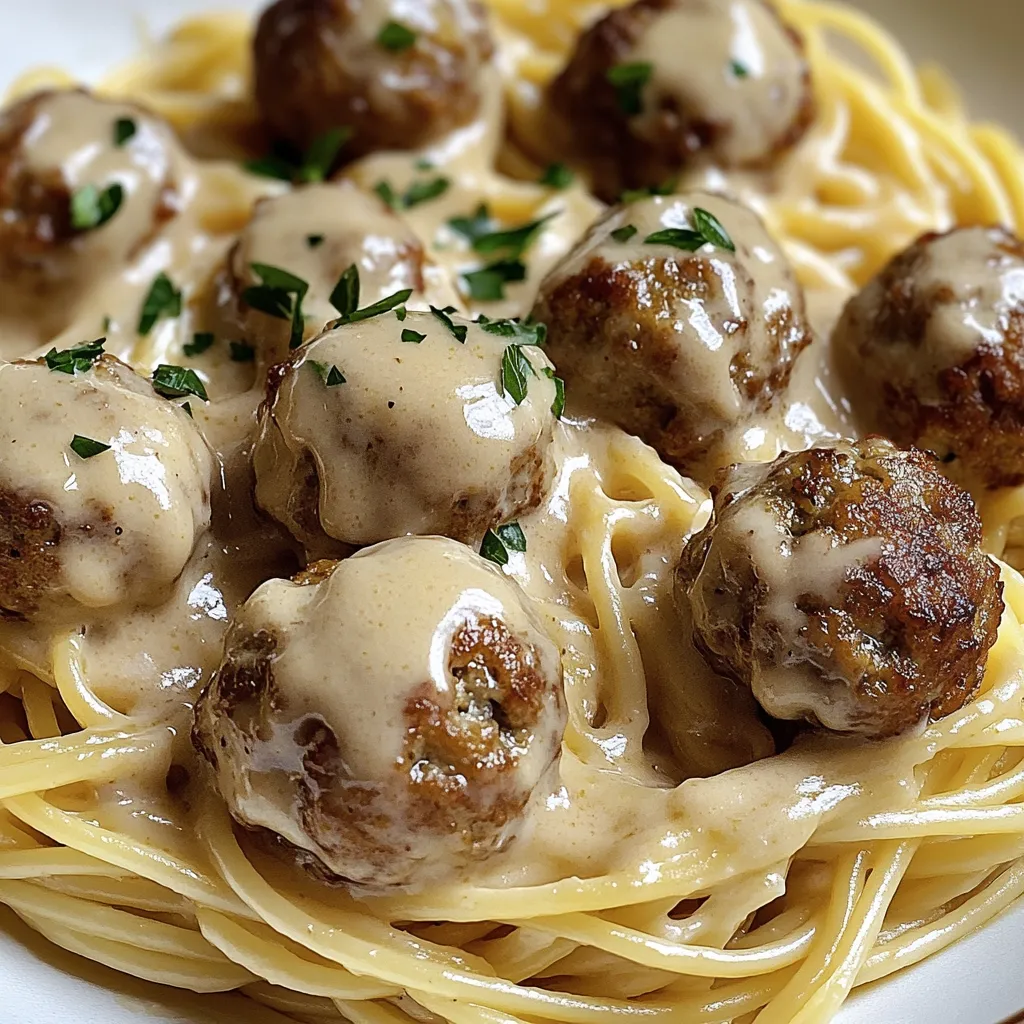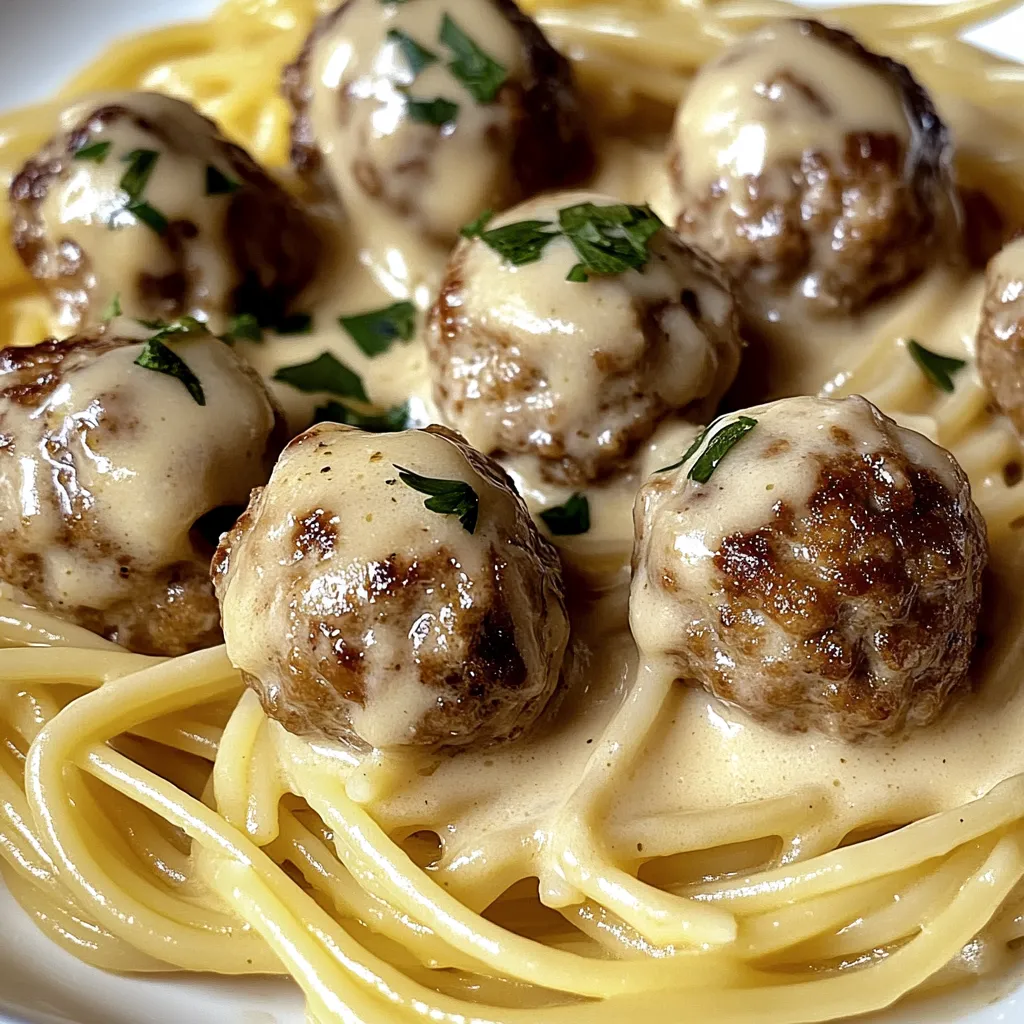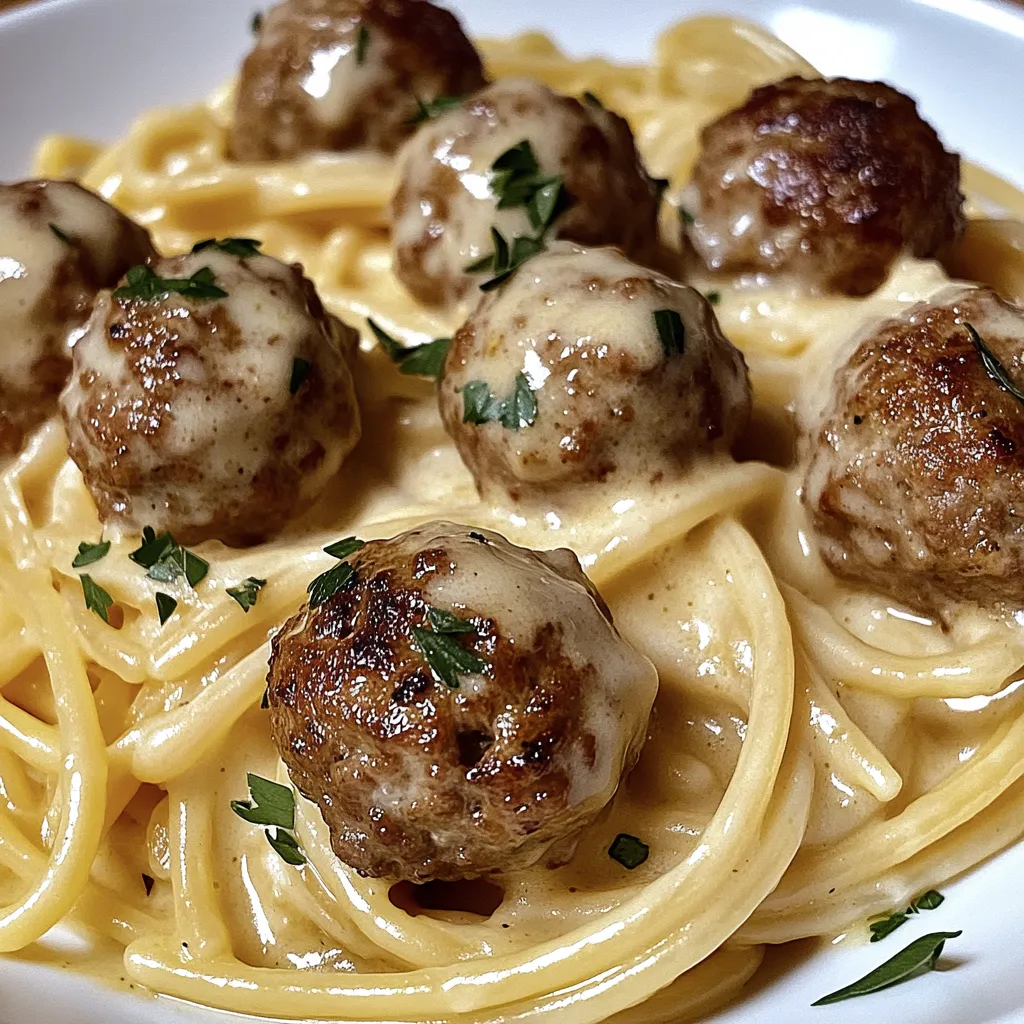 Pin it
Pin it
Tender meatballs glisten with garlic-infused butter atop silky pasta strands. This remarkable combination transforms everyday ingredients into an extraordinary meal worthy of both weeknight dinners and special occasions. The savory meatballs deliver perfect texture—crisp exteriors giving way to juicy centers with every bite. Meanwhile, the linguine bathes in velvety Parmesan cream that clings beautifully to each pasta ribbon, creating the ideal foundation for this satisfying dish.
The first time this dish graced our dinner table, conversation ceased completely as everyone focused entirely on their plates. My teenage nephew, notorious for picking at his food, cleaned his plate entirely and asked if there were seconds. My mother-in-law, typically reserved with compliments, requested the recipe before leaving. Something about the combination of garlic-scented meatballs with creamy pasta creates an almost magical dining experience that pleases both sophisticated palates and picky eaters alike.
Perfect Ingredients
- Ground beef: Forms the substantial base with satisfying richness. An 80/20 lean-to-fat ratio provides ideal flavor and juiciness rather than leaner options that can become dry.
- Breadcrumbs: Create perfect texture while trapping moisture within meatballs. Panko offers lighter results though traditional crumbs work beautifully too.
- Parmesan cheese: Contributes savory depth to both meatballs and sauce. Freshly grated delivers significantly better flavor and texture than pre-packaged versions.
- Fresh garlic: Infuses both components with aromatic richness. Mince finely for even distribution and proper incorporation throughout the dish.
- Dried herbs: Provide convenient flavor foundation without requiring fresh herbs. The Mediterranean combination of oregano and basil complements both meatballs and pasta perfectly.
- Whole egg: Binds meatball ingredients while adding subtle richness. Room temperature eggs incorporate more smoothly than cold ones.
- Linguine pasta: Creates the ideal vehicle for capturing creamy sauce. The flat, ribbon-like shape holds sauce beautifully compared to round pasta varieties.
- Heavy cream: Forms luxurious sauce base with proper thickness. Full-fat version produces significantly superior results to lighter alternatives.
- Butter: Adds silky richness to both meatballs and sauce. Unsalted varieties allow better seasoning control throughout the dish.
- Fresh parsley: Brightens finished dish with vibrant color and herbaceous notes. The slight pepperiness cuts through richness beautifully.
Cooking Method
- Careful Combination:
- Begin meatball preparation by combining ingredients with gentle touch rather than aggressive mixing. Overworking creates dense, tough results instead of tender bites. Mix just until ingredients distribute evenly throughout meat, stopping before mixture becomes paste-like. This restraint ensures meatballs remain light and juicy rather than heavy and compact. The proper technique creates remarkable texture difference with minimal additional effort.
- Perfect Portioning:
- Create uniformly sized meatballs using gentle shaping technique—rolling between palms with light pressure rather than compacting tightly. This consistent sizing ensures even cooking throughout, preventing some meatballs from overcooking while others remain underdone. The ideal size—approximately 1½ inches diameter—creates perfect balance between exterior browning and interior tenderness while providing satisfying bite-sized portions.
- Proper Browning:
- Develop essential flavor through careful searing in hot skillet, creating golden crust before meatballs finish cooking through. Allow proper space between each meatball rather than crowding pan, which creates steam instead of caramelization. Turn occasionally to ensure even browning on all sides while maintaining gentle handling to preserve shape. This meticulous approach creates concentrated flavor compounds impossible to achieve through baking alone.
- Sauce Mastery:
- Transform the same pan used for meatballs into flavor-rich sauce foundation, capturing all developed fond—those browned bits containing concentrated essence. Begin sauce with melted butter and fresh garlic, cooking briefly until fragrant without browning. Add cream gradually while stirring continuously to incorporate all flavor particles from pan bottom. Simmer gently until slightly thickened before incorporating cheese, which creates silky emulsion rather than grainy texture.
- Pasta Perfection:
- Cook linguine precisely to al dente stage—typically one minute less than package directions suggest—as it will continue softening slightly when combined with hot sauce. Reserve small amount of starchy cooking water before draining to adjust sauce consistency if needed. Toss pasta directly into sauce rather than plating pasta first then topping with sauce, which ensures every strand receives proper coating. This simple technique transforms good pasta into exceptional pasta with minimal additional effort.
 Pin it
Pin it
My first attempt at this dish taught me valuable lessons about heat management and timing. When I initially cooked meatballs over too-high heat, they developed beautiful color but remained undercooked inside. Now I maintain medium heat consistently, allowing slightly more time for proper doneness throughout. Similarly, I discovered the importance of properly emulsifying cheese into cream sauce—adding gradually while sauce temperature remains below simmering prevents separation and graininess. These small adjustments transformed good results into consistently exceptional ones.
Serving Suggestions
Elevate this pasta experience by serving with simple arugula salad dressed with lemon vinaigrette for bright, peppery contrast to the rich main dish. Consider offering warm, crusty bread for capturing every drop of the remarkable sauce. For elegant presentation, twirl pasta into neat mounds using carving fork and large spoon before topping with meatballs and fresh herbs. Wine enthusiasts appreciate how medium-bodied Sangiovese complements both beef and cream components beautifully. During summer months, add simple tomato-basil bruschetta alongside for bright seasonal counterpoint.
Creative Variations
Transform this classic by substituting ground turkey or chicken for lighter version that maintains excellent texture and flavor. Create Mediterranean variation by incorporating chopped spinach and feta cheese into meatball mixture for bright flavor and color contrast. Experiment with different pasta shapes such as fettuccine or pappardelle for textural variety while maintaining sauce-capturing abilities. Consider spicy adaptation by adding crushed red pepper flakes to both meatballs and sauce for warming heat that balances richness. For special occasions, incorporate wild mushrooms into cream sauce for earthy complexity that complements beef beautifully.
Storage Solutions
Maintain optimal texture by refrigerating meatballs and pasta separately in airtight containers for up to three days. Reheat meatballs in covered skillet with splash of broth or water to maintain moisture, while warming pasta gently with additional cream to revive sauce consistency. For make-ahead convenience, prepare meatballs completely then refrigerate before combining with freshly made pasta and sauce just before serving. Freeze uncooked meatballs in single layer until solid, then transfer to freezer bags for up to three months—thaw overnight in refrigerator before cooking for best results.
The journey to perfect meatballs and pasta taught me valuable lessons about ingredient temperature and cooking sequence. When I began ensuring all components reached room temperature before cooking—rather than working with cold ingredients directly from refrigerator—the results improved dramatically. Similarly, discovering that adding hot pasta directly to sauce created creamier results than plating pasta first transformed ordinary dinner into something special. These thoughtful adjustments elevated simple comfort food into memorable dining experience worthy of sharing with friends and family.
 Pin it
Pin it
Frequently Asked Questions
- → What type of meat is best for the meatballs?
- Ground beef or pork, or a mix of both, works well.
- → Can I use a different type of pasta?
- Yes, you can substitute linguine with spaghetti or fettuccine.
- → How long does it take to cook?
- It takes about 40 minutes in total, including prep and cook time.
- → Can I make this recipe ahead of time?
- Yes, you can prepare the meatballs and sauce ahead of time and reheat before serving.
- → What can I serve with this dish?
- Serve with a side salad or garlic bread for a complete meal.
